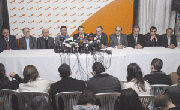Another drawn-out crisis and possible civil unrest is feared in Lebanon following the collapse of its government on Wednesday, Jan. 12 when the powerful Hizbullah and its allies withdrew from the country’s coalition government.

|
| Analysts believe that Hariri will not be renamed prime minister if he refuses to reach a deal that is acceptable to Hizbullah. |
Salem said that there is an unpredictability factor regarding potential civil clashes on the streets, although he doesn’t believe that military action is likely to take place following the withdrawal.
A total of all 11 ministers from Hizbullah and its allies withdrew from Prime Minister Saad Hariri’s government on Wednesday night, which constituted the minimum number of resignations to Constitutionally dissolve the 30-member cabinet.
The decision to withdraw was intentionally announced at a press conference at Aoun’s residence at Rabieh, near Beirut coinciding with Hariri’s meeting with U.S. President Barack Obama at the White House in Washington, D.C.
The motive for the decision to withdraw is linked to a long-time dispute stemming from the UN-backed Special Tribunal for Lebanon (STL), which is likely to indict high-ranking Hizbullah members in the February 14, 2005 assassination of former Lebanese prime minister Rafiq Hariri, Saad’s father.
Hizbullah, a Shia group, denied the accusations and has vowed to defend itself against any arrest attempts by the tribunal, which it has said is a U.S.-Israeli collaboration effort against the group and its armed resistance against Israel.
Analysts have said that the collapse of Hariri’s government could lead to the beginning of a total overhaul of Lebanon’s vulnerable state institutions.
Some experts also believe that the withdrawal by Hizbullah and its allies could be aimed at making sure that there is no government available to make arrests when the STL announces its indictments.

|
| Lebanese opposition ministers announce their ministerial resignation during a news conference in Rabieh, near Beirut, January 12, 2011. REUTERS |
If Hizbullah and its allies do not assume control, Saad-Ghorayeb believes that a civil war could eventually break out.
The cabinet collapse came after a failed joint attempt between leaders of Syria and Saudi Arabia to break the ongoing stalemate over the tribunal and other governing issues. News from Washington, D.C. reports that Hariri yielded to the pressure of the Obama administration and aborted the regional brokered deal.
Lebanese Christian leader, lawmaker, Free Patriotic Movement head and Hizbullah ally Michel Auon announced on Tuesday, Jan. 11 that he had officially been informed of the failure of the Syrian-Saudi efforts and that members of the majority group led by Prime Minister Saad Hariri were not responsive to the initiatives.
Saad Hariri had faced mounting political pressure to denounce the tribunal.
The government collapse has led to what is being called Lebanon’s worst political turmoil since 2008, when a government crisis of 18 months led to deadly street clashes and the Beirut airport was closed.
A scenario of civil war is being downplayed but many analysts can’t foresee a viable diplomatic end to the crisis.
The feeling is that things could spiral out of control at any moment according to Sahar Atrache, a Middle East analyst with the International Crisis Group.
Lebanese President Michel Sleiman is now obligated under the Constitution to hold consultations with Lebanon’s 128 MP’s on the subject of naming a new prime minister, who has to be a Sunni Muslim. The prime minister will then form a new government.
The newly-formed government will need to obtain a simple majority of 128 members of Parliament.
Saad Hariri is Lebanon’s most popular leader among Sunnis but his camp’s enmity with Hizbullah damages his chances of being reappointed, especially because the current political realignment will most likely not give him a clear majority.
Druze leader Walid Jumblatt, who holds 11 crucial parliamentary votes, could be the deciding factor in selecting the new prime minister.
Hariri’s coalition has 60 seats while Hizbullah’s coalition is a close second with 57 seats.
In 2009, Jumblatt, once Hariri’s closest anti-Syrian ally, announced that he had repositioned himself to be closer with Hizbullah and once again an ally to Syria.
Analysts believe that Hariri will not be not be asked to form a new government if he refuses to reach a deal that is acceptable to Hizbullah.






Leave a Reply